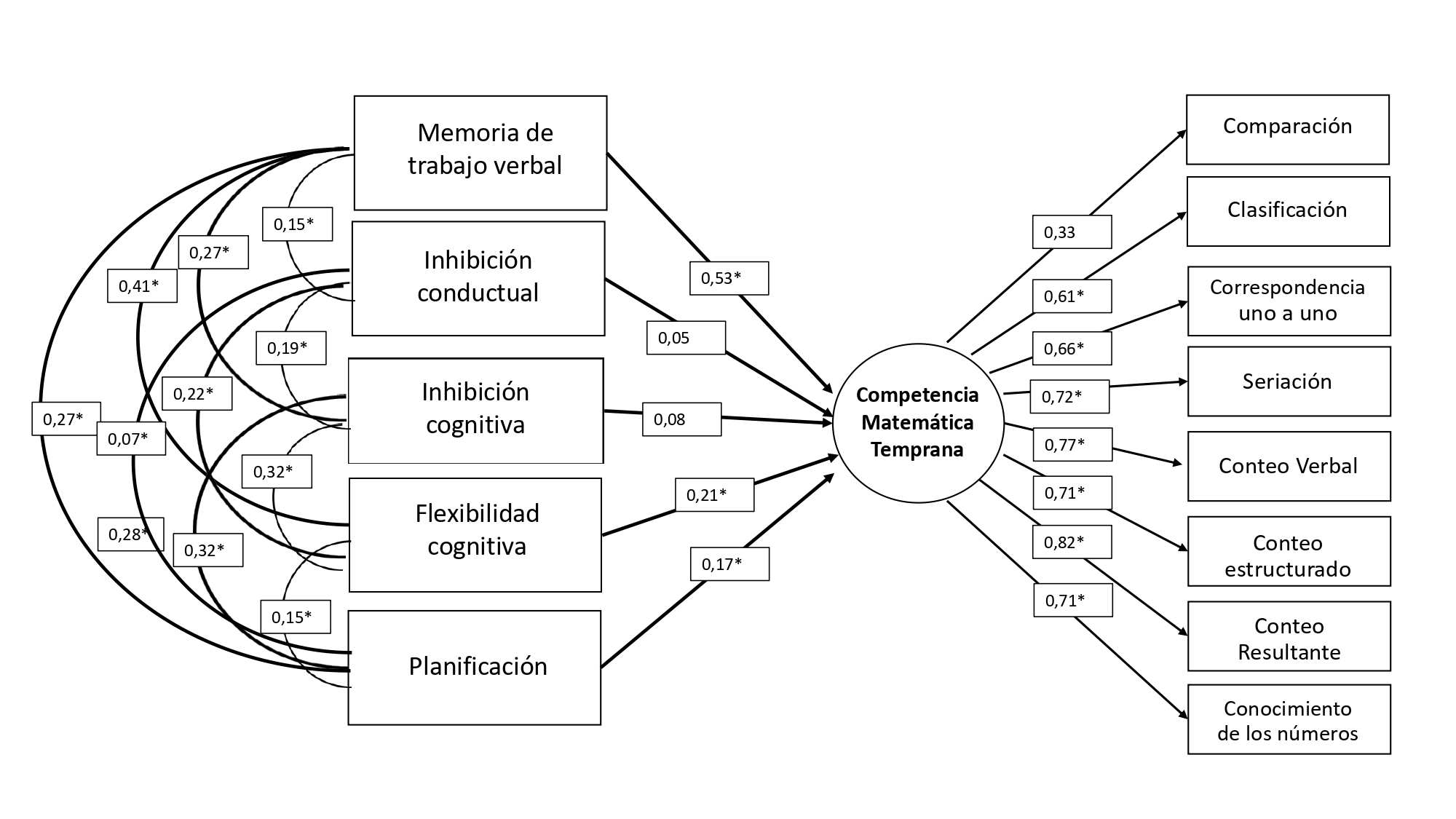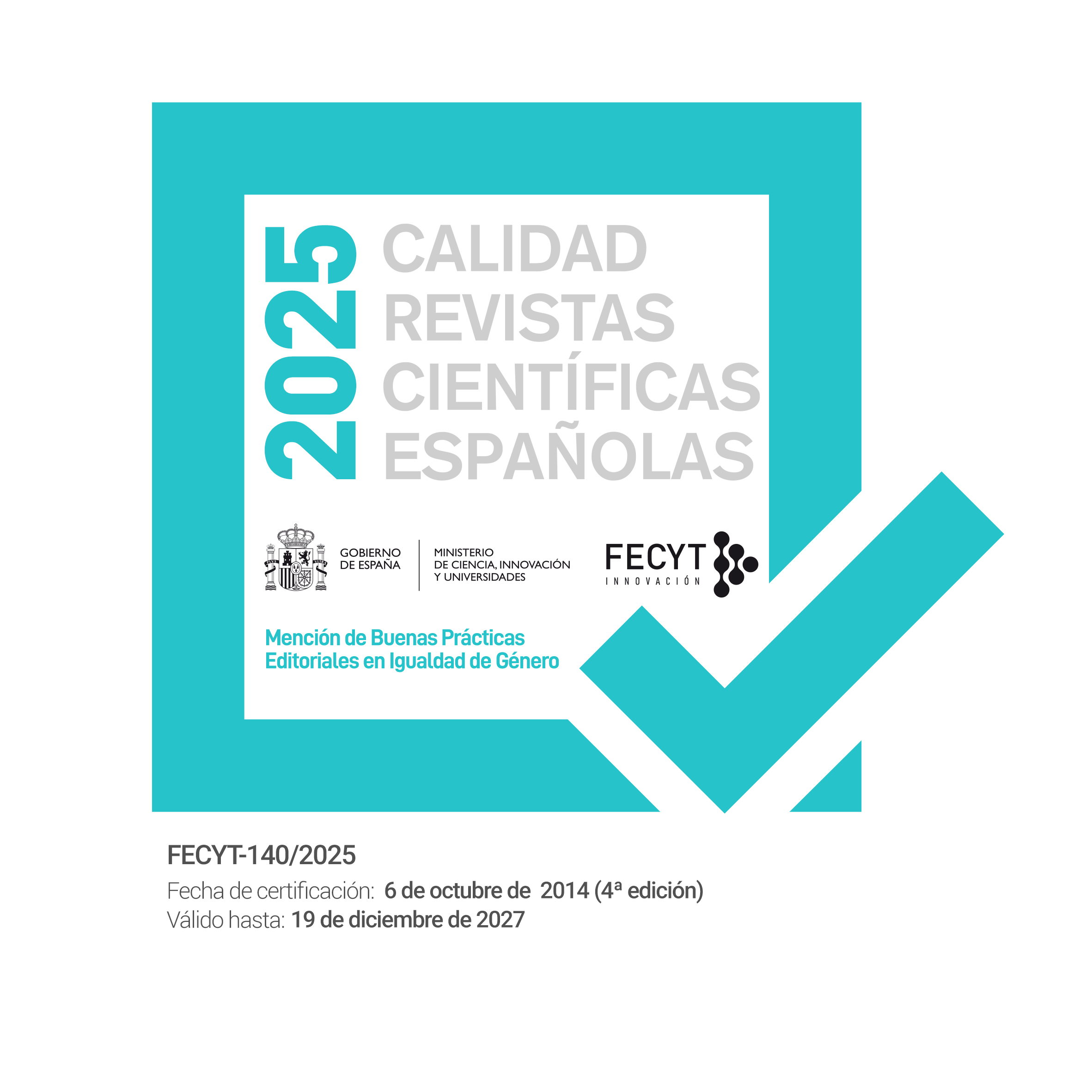The effect of executive functions on early mathematical competence: a structural equation model
DOI:
https://doi.org/10.5944/educxx1.36509Keywords:
working memory, inhibition, cognitive flexibility, planning, mathematical skills, childhood educationAbstract
Although the role of executive functions in childhood mathematics learning has been extensively studied, there is no consensus on the specific contribution of each executive function in the development of early mathematical skills. This study aimed to determine the validity of a structural equation model of the executive functions of verbal working memory, behavioral inhibition, cognitive inhibition, cognitive flexibility, and planning to explain the variability in the level of development of early mathematical skills in children in kindergarten. We implemented a cross-sectional design of descriptive correlational cut, in which 130 students in the second cycle of early childhood education participated, 64 girls (49.2%; M=66.50 months, SD=7.95 months), 66 boys (50.8%; M=65.30 months, SD=8.10 months), belonging to four Chilean schools. We used five executive tasks and a test of early mathematical skills for the assessments. We performed descriptive analyses, correlations, and structural equation modeling to determine the combined statistical effect of executive functions on early mathematical skills. The results show that the five executive functions explain 57.3% of the variability of the scores achieved by children in early mathematical skills, highlighting the role of verbal working memory, cognitive flexibility, and planning. These results represent a significant contribution to current knowledge on the executive functions that may explain the differentiated performance in mathematics of children in early childhood education, providing relevant information to teachers regarding the executive demands necessary for each mathematical skill, which may favor the integration of teaching strategies that incorporate the stimulation of executive functions in classroom work, thus promoting improvements in the learning of this disciplinary area.
Downloads
References
Agudelo, N., Dansilio, S., & Beisso, A. (2016). Diferentes tareas de solución de problemas y funciones ejecutivas en niños de 7 a 12 años. Neuropsicología Latinoamericana, 8(2), 35–42.
Allen, K., Giofrè, D., Higgins, S., & Adams, J. (2021). Using working memory performance to predict mathematics performance 2 years on. Psychological Research, 85(5), 1986–1996. https://doi.org/10.1007/s00426-020-01382-5
Aragón, E., Navarro, J. I., Aguilar, M., & Cerda, G. (2015). Cognitive predictors of 5-year-old students’ early number sense. Revista de Psicodidáctica, 20(1), 83–97. https://doi.org/10.1387/RevPsicodidact.11088
Aragón, E., Cerda, G., Aguilar, M., Mera, C., & Navarro, J. (2021). Modulation of general and specific cognitive precursors to early mathematical competencies in preschool children. European Journal of Psychology of Education, 36, 405–422. https://doi.org/10.1007/s10212-020-00483-4
Arán, V., & Krumm, G. (2020). A hierarchical model of cognitive flexibility in children: extending the relationship between flexibility, creativity and academic achievement. Child Neuropsychology: a Journal on Normal and Abnormal Development in Childhood and Adolescence, 26(6), 770–800. https://doi.org/10.1080/09297049.2019.1711034
Arantes de Araújo, L., Veloso, C. F., Souza, M. C., Azevedo, J., & Tarro, G. (2021). The potential impact of the COVID-19 pandemic on child growth and development: a systematic review. Jornal de Pediatria, 97(4), 369–377.https://doi.org/10.1016/j.jped.2020.08.008
Arroyo, M., Korzeniowski, C., & Espósito, A. (2014). Habilidades de planificación y organización, relación con la resolución de problemas matemáticos en escolares argentinos. Eureka, 11(1), 52–64.
Barrouillet, P., & Camos, V. (2003). Savoirs, savoir-faire arithmétiques, et leurs deficiencies.En M. Kail & M. Fayol (Eds.), Les sciences cognitives et l’école (pp. 305-351). Presses Universitaires de France. https://doi.org/10.3917/puf.coll.2003.01.0305
Bernal-Ruiz, F., Rodríguez-Vera, M., & Ortega, A. (2020). Estimulación de las funciones ejecutivas y su influencia en el rendimiento académico en escolares de primero básico. Interdisciplinaria. Revista de Psicología y Ciencias Afines, 37(1), 1–34. http://dx.doi.org/10.16888/interd.2020.37.1.6
Bull, R., & Lee, K. (2014). Executive functioning and mathematics achievement. Child Development Perspectives, 8, 36–41. https://doi.org/10.1111/cdep.12059
Buttelmann, F., & Karbach, J. (2017). Development and plasticity of cognitive flexibility in early and middle childhood. Frontiers in Psychology, 8, 1–6. https://doi.org/10.3389/fpsyg.2017.01040
Cerda, G., Pérez, C., Moreno, C., Núñez, K, Quezada, E., Rebolledo, J., & Sáez, S. (2012). Adaptación de la versión española del Test de Evaluación Matemática Temprana de Utrecht en Chile. Revista Estudios Pedagógicos, 38(1), 235–253.https://doi.org/10.4067/s0718-07052012000100014
Cheung, S. K., & Chan, W. (2022). The roles of different executive functioning skills in young children’s mental computation and applied mathematical problem-solving. The British Journal of Developmental Psychology, 40(1), 151–169. https://doi.org/10.1111/bjdp.12396
Chu, F. W., vanMarle, K., & Geary, D. C. (2016). Predicting children’s reading and mathematics achievement from early quantitative knowledge and domain-general cognitive abilities. Frontiers in Psychology, 7, 1–14. https://doi.org/10.3389/fpsyg.2016.00775
Cueli, M., Areces, D., García, T., Alves, R. A., & González-Castro, P. (2020). Attention, inhibitory control and early mathematical skills in preschool students. Psicothema, 32(2), 237–244. https://doi.org/10.7334/psicothema2019.225
Devlin, B., Jordan, N., & Klein, A. (2022). Predicting mathematics achievement from subdomains of early number competence: differences by grade and achievement level. Journal of Experimental Child Psychology, 217, 105354. https://doi.org/10.1016/j.jecp.2021.105354
Diamond, A. (2020). Executive functions. En A. Gallagher, C. Bulteau, D. Cohen, & J. L. Michaud (Eds.). Handbook of Clinical Neurology, 173, 225–240. https://doi.org/10.1016/B978-0-444-64150-2.00020-4
Flora, D. B. & Curran, P. J. (2004). An empirical evaluation of alternative methods of estimation for confirmatory factor analysis with ordinal data. Psychological Methods, 9(4), 466–491. https://doi.org/10.1037/1082-989X.9.4.466
Fung, W. K., Chung, K., & Lam, C. B. (2020). Mathematics, executive functioning, and visual-spatial skills in Chinese kindergarten children: examining the bidirectionality. Journal of Experimental Child Psychology, 199, 104923. https://doi.org/10.1016/j.jecp.2020.104923
González-Castro, P., Rodríguez, C., Cueli, M., Cabeza, L., & Álvarez, L. (2014). Competencias matemáticas y control ejecutivo en estudiantes con Trastorno por Déficit de Atención con Hiperactividad y Dificultades de Aprendizaje de las Matemáticas. Revista de Psicodidáctica, 19(1), 125–143.https://doi.org/10.1387/RevPsicodidact.7510
Krikorian, R., & Bartok, J. (1998). Developmental data for the Porteus Maze Test. The Clinical Neuropsychology, 12(3), 305–310. https://doi.org/10.1076/clin.12.3.305.1984
Kurgansky, A. V. (2022). Assessment of executive functions in children aged 3–6 years: current state, challenges, and perspectives. Neuroscience and Behavioral Physiology, 52, 297–307. https://doi.org/10.1007/s11055-022-01237-z
Magalhães, S., Carneiro, L., Limpo, T., & Filipe, M. (2020). Executive functions predict literacy and mathematics achievements: the unique contribution of cognitive flexibility in grades 2, 4, and 6. Child Neuropsychology, 26(4), 1–19.https://doi.org/
1080/09297049.2020.1740188
Mammarella, I. C., Toffalini, E., Caviola, S., Colling, L., & Szűcs, D. (2021). No evidence for a core deficit in developmental dyscalculia or mathematical learning disabilities. Journal of Child Psychology and Psychiatry, And Allied Disciplines, 62(6), 704–714. https://doi.org/10.1111/jcpp.13397
Miyake, A., Friedman, N., Emerson, M., Witzki, A., Howerter, A., & Wager, T. (2000). The unity and diversity of executive functions and their contributions to complex «frontal lobe» tasks: a latent variable analysis. Cognitive Psychology, 41(1), 49–100. https://doi.org/10.1006/cogp.1999.0734
Morgan, P. L., Farkas, G., Hillemeier, M. M., Pun, W. H., & Maczuga, S. (2019). Kindergarten children’s executive functions predict their second-grade academic achievement and behavior. Child Development, 90(5), 1802–1816. https://doi.org/10.1111/cdev.13095
Passolunghi, M. C., Mammarella, I. C., & Altoé, G. (2008). Cognitive abilities as precursors of the early acquisition of mathematical skills during first through second grades. Developmental Neuropsychology, 33(3), 229–250. https://doi.org/10.1080/87565640801982320
Peres, C., & Vargas, B. (2021). Systematic review on the precursors of initial mathematical performance. International Journal of Educational Research Open, 2, 100035, https://doi.org/10.1016/j.ijedro.2021.100035
Piaget, J. (1965). The child’s conception of number. W.W. Norton & Co.
Porteus S. D. (1965). Porteus Maze Test. Fifty years application. Psychological Corporation.
Purpura, D. J., Schmitt, S. A., & Ganley, C. M. (2017). Foundations of mathematics and literacy: the role of executive functioning components. Journal of Experimental Child Psychology, 153, 15–34. https://doi.org/10.1016/j.jecp.2016.08.010
Simanowski, S., & Krajewski, K. (2019). Specific preschool executive functions predict unique aspects of mathematics development: a 3-year longitudinal study. Child Development, 90(2), 544–561. https://doi.org/10.1111/cdev.12909
Stad, F., Van Heijningen, C., Wield, K., & Resing, W. (2018). Predicting school achievement: differential effects of dynamic testing measures and cognitive flexibility for math performance. Learning and Individual Differences, 67, 117–125. https://doi.org/10.1016/j.lindif.2018.07.006
Tenorio, M., Arango, P., Aparicio, A., Benavente, C., Thibaut., C., & Rosas, R. (2012). Test de Evaluación Neuropsicológica Infantil TENI. CedeTi UC.
Van De Rijt, B. & Van Luit, J. (1998). Effectiveness of the Additional Early Mathematics program for teaching children early mathematics. Instructional Science, 26(5), 337–358. https://doi.org/10.1023/a:1003180411209
Van Luit, J. E. H., & Van de Rijt, B. A. M. (2009). The Early Numeracy Test revised. Graviant publishers.
Woodcock, R. W., Alvarado, C. G., Schrank, F. A., McGrew, K. S., Mather, N., & Muñoz-Sandoval, A. F. (2019). Batería IV Woodcock-Muñoz: Tests of Cognitive Abilities. Riverside Publishing.
Wongupparaj, P., & Kadosh, R. C. (2022). Relating mathematical abilities to numerical skills and executive functions in informal and formal schooling. BMC Psychology, 10(1), 27. https://doi.org/10.1186/s40359-022-00740-9
World Conferences on Research Integrity. (2010). The Singapore Statement on Research Integrity.
Yeniad, N., Malda, M., Mesman, J., Van Ijzendoorn, M. H., & Pieper, S. (2013). Shifting ability predicts math and reading performance in children: a meta-analytical study. Learning and Individual Differences, 23, 1–9. https://doi.org/10.1016/j.lindif.2012.10.004
Zelazo, P. D. (2006). The Dimensional Change Card Sort (DCCS): a method of assessing executive function in children. Nature Protocols, 1(1), 297–301. https://doi.org/10.1038/nprot.2006.46
Zhang, X., Fu, W., Xue, L., Zhao, J., & Wang, Z. (2019). Children with mathematical learning difficulties are sluggish in disengaging attention. Frontiers in Psychology, 10(932), 1–9. https://doi.org/10.3389/fpsyg.2019.00932

Downloads
Published
How to Cite
Issue
Section
License
Copyright (c) 2023 Francisca Bernal-Ruiz, Gamal Cerda

This work is licensed under a Creative Commons Attribution-NonCommercial 4.0 International License.
Educación XX1 is published under a Creative Commons Attribution-NonCommercial 4.0 (CC BY-NC 4.0)










